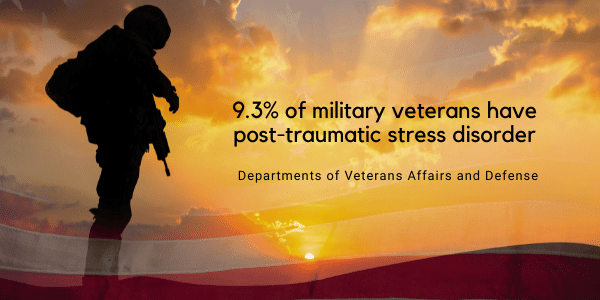
Among the many debates about legalized cannabis, there is a compassionate cause. Behind the fight for the decriminalization of cannabis and access to legal medical marijuana are patients. They are people who have chronic health conditions, who need new options for symptom management. This also includes veterans.
Opioids and prescription NSAIDs aren’t the solutions for everyone. And for many patients, they simply do not work. Some clinical studies have suggested that long-term use of opioid medications can increase pain. Opioid medications can increase the sensitivity of pain receptors. Opioids may not solve the problem, but they can make chronic pain worse for some patients.
In states resisting accommodating patients with true access to medical cannabis, the fight against social stigma. Misconceptions about cannabis that stem back to 1930’s propaganda. How cannabis has been demonized over the decades globally as well as domestically is confusing to many people. While other controlled substances that have been clinically proven to cause health problems remain legalized and taxed. And available in every convenience store.
Veterans coast to coast are organizing to promote awareness and petition political leaders to expand access to medical cannabis, particularly in the Southern United States, where cannabis misconceptions and social opposition are strongest.
While some would argue that only ‘potheads’ want to see cannabis legalized, a new and respectable voice has joined the fight—American veterans. The military servicemen and servicewomen who dedicated their lives to defending our country are now advocating loudly for access to medical cannabis, particularly in the Southern American states that seem to be culturally opposed to it.
Some of the Southern States are the last to legalize medical marijuana. And other states (like Texas) have what some would call a token medical cannabis program—legalizing it to such a restrictive extent that few patients can qualify for it or utilize it.
And now, our American veterans with health problems are standing up to be heard. To help eliminate some of the biases and misconceptions about medical cannabis. While also expanding access to alternative medicine approaches for managing symptoms of chronic disease and mental health disorders.
When veterans return from service, for some, a new war begins. And that is living with various physical impairments that they received during their time in active duty. For some American veterans, the wounds aren’t visible. They may have significant mental health challenges because of their experiences in combat.
Some of the most common injuries that military servicemen and women have are:
The CDC definition of a traumatic brain injury is “a disruption in the normal function of the brain that can be caused by a bump, blow or jolt to the head, or penetrating head injury.” The Defense and Veterans Brain Injury Center (DVBIC) reported 414,000 TBI’s among American military service persons in 2000. Currently, more than 185,000 American veterans are treated for traumatic brain injuries by VA hospitals and health clinics.
Patients diagnosed with a traumatic brain injury (TBI) can experience a variety of symptoms. Those symptoms can include memory loss, problems with loss of consciousness, amnesia, fainting, and fatigue. Few people know that TBIs can also significantly impact mental health and behavior. A TBI can cause irritability, impulsivity, depression, anxiety, anger, and feelings of loneliness and isolation.
American veterans may contact chemicals, paints, radiation, and other contaminants while in service. Smoke from burn pits and sand particulates from desert warfare can also cause significant respiratory problems.
The Departments of Veterans Affairs and Defense reports that only 1% of vets have traumatic amputations. However, the data also says that more than 80% of veterans with service-related amputations have companion diagnoses. They may be diagnosed with mental disorders, nervous system diseases, impairments to organ functioning, and musculoskeletal problems.
A small percentage of American veterans also have toxic foreign materials embedded below the skin. This can be metal shrapnel or other material particulates that present a health risk.

It is not that difficult to imagine why American veterans may have a higher-than-average rate of mental health disorders compared to civilians. In one clinical study, 1.15 million veterans were diagnosed with at least 1 of the five major mental illnesses.
Military veterans are looking for additional resources and options to help them manage health needs and clinical disorders in every state. In 2020, the Departments of Veterans Affairs and Defense stated that cannabis prohibition was the stance of the DEA, not the VA. They said that VA doctors were not permitted to recommend medical marijuana for veterans. However, veterans who did get a medical card to use medical marijuana would not risk losing their VA benefits either.
A United States military veteran knows a thing or two about stigmas. And how they can be embellished to create hardships and untruths. Many veterans who have been diagnosed with PTSD find it difficult to become civilian employed. And other veterans who may have PTSD suffer in silence, not wanting to be diagnosed and identified with a misunderstood mental health disorder. Conclusion: it is generally more acceptable for a military veteran who has a physical disability than one who returns home with a psychological wound that requires healing. And support.
Medical marijuana can help veterans in several ways. Like any patient, some veterans may have problems with chronic pain from injuries they received while in service. Some studies suggest that many veterans have both physiological and psychological impairments. And conventional treatment of bodily injuries can exacerbate mental health disorders.
The first line of treatment for injuries or disabilities is physiotherapy and pharmacology. That means prescriptions for medications like opioids. Legal prescription pain medications have a higher potential for addiction. Consequently, some can have side effects that can increase feelings of depression and anxiety.
In many clinical studies, medical marijuana has been effective at providing relief from depression and anxiety. Post-traumatic stress disorder has both elements of mental health and physical symptoms. Doctor-supervised cannabis could help veteran’s moderate symptoms of PTSD. It may also provide a safer mild daytime analgesic for pain and effective nighttime relief of inflammation and other symptoms.
If veterans were to start a pro-cannabis movement, North Carolina would be the best place to ignite it. More than 700,000 military veterans are living in North Carolina. And the state always has the highest population of resident veterans in the country. There are currently eight military bases in North Carolina.
North Carolina has called itself the most veteran-friendly state in America. But when it comes to medical marijuana, the state has dug in its heels. Right now, only patients that have epilepsy may apply for access. And even the new incoming legislation for 2022 (Senate Bill 711) doesn’t go far enough to provide access to medical cannabis products and potencies that veterans want.
The new group is called NC Families for Medical Cannabis. And they want to support Senate Bill 711 as a first important step to legalizing medical cannabis in North Carolina. It will also provide more options for veterans who want to try alternative medicines.
Patients living in Southern states with conservative social and political blockades against medical cannabis are frustrated. Patients are surrounded by states that do a much better job administering medical marijuana programs that help patients. Including providing retail dispensaries and legalizing different intake methods to give patients more options.
What starts in North Carolina could catch fire and prompt other veterans’ groups to outwardly support medical cannabis legalization. And less restrictive programs so that no patient is left behind if therapeutic cannabis could improve their quality of life.
No Information on MarijuanaDoctors.Com should be used to diagnose, treat, prevent or cure any disease or condition. You can view our Full Disclaimer here.